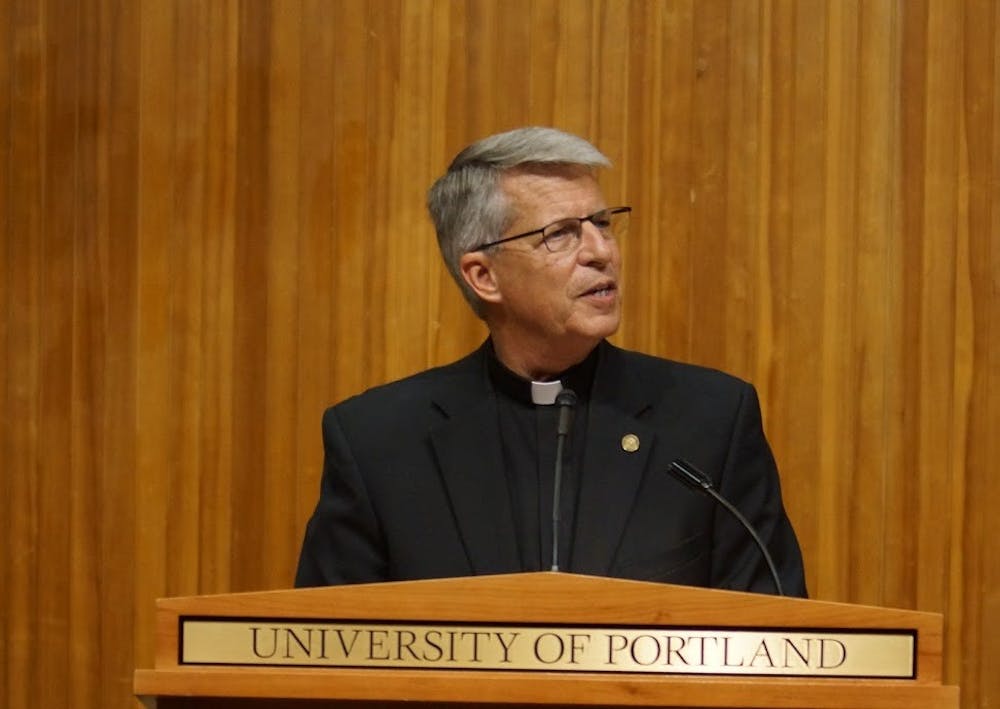University President Fr. Mark Poorman unveiled the University’s new strategic plan to faculty and staff Tuesday afternoon. The five-year plan aspires to diversify the staff, student body and curriculum, increase student access to mental health resources, and enhance academics and campus infrastructure, among other things.
Poorman outlined the plan to a full auditorium in the Buckley Center Auditorium at the President’s Opening Convocation speech Tuesday afternoon.
He also gave an update on the new Dundon-Berchtold Hall to be built on the site of Howard Hall, which will be torn down at a date that has yet to be announced. The new academic building is in its design phase and is slated to open in 2018.
The 65,000 square-foot building, roughly the size of Franz Hall, is set to provide 23 classrooms, 30 faculty offices, a new career center and a new space for the Dundon-Berchtold Institute, a campus effort to improve students’ moral and ethical foundations.
Diversifying the University is embedded throughout the strategic plan. Known as Vision 2020, this plan is the first time a UP strategic plan has addressed diversity.
“At the University of Portland, we prepare our students to live and serve and lead in a diverse society and world,” Poorman said. “This is why our commitment to and success with increasing diversity and inclusion are essential to the University’s mission.”
Part of that goal includes enhancing the liberal arts core curriculum to reflect diverse perspectives across disciplines.
Poorman noted that the University has been working toward diversifying faculty and staff in recent years. According to the Department of Human Resources, 16 percent of the current faculty and staff identify as non-white in a survey conducted in 2016, up from 12 percent in a survey from 2014.
“While there is clearly more to do, we are making some positive strides toward increasing racial and ethnic diversity among the University’s faculty and staff,” Poorman said.
He also announced plans to expand staff and faculty knowledge of how to support students and colleagues from diverse backgrounds. Already this fall, administration has scheduled a series of five professional development workshops for faculty and staff about engaging diversity and inclusion in classes.
Poorman also addressed mental health needs, acknowledging the student suicides in recent years and an increase in students dealing with, and being vocal about, anxiety and depression.
“We have a responsibility to these students, but also to the myriad of students who are not in crisis, that are struggling every day with mental health issues that impact their ability to thrive and to be healthy,” Poorman said. “If we are going to say that we are a community committed to the safety and the wellness of all of our students, faculty, staff, then we need to take concrete steps to show that to be true.”
Part of the plan for increasing mental health resources includes implementing recommendations the President heard from the Ad Hoc Panel on Mental Health formed last fall.
Poorman mentioned examples of where the recommendations have already been implemented, including the suggestion that every course syllabus include a statement about available mental health resources.
The name of the Health Center was changed to the Health and Counseling Center. A fourth full-time clinical psychologist was added to staff. The institutional student leave policy has been updated to meet the needs of students who take time off from school for mental health reasons. UP has also joined the JED campus program that will work with the University to create a four-year strategic mental health plan to improve campus policies and services.
Poorman also spoke about expanding the University’s graduate programs, strengthening the visibility of the Catholic and Holy Cross character, increasing opportunities for and availability of study abroad, and continuing to promote communication across academic and administrative units.
Over several months, a steering committee chaired by Provost Thomas Greene and Vice President for Financial Affairs Alan Timmins led five subcommittees to gather input from faculty, staff, students, regents and alumni through meetings, surveys, listening sessions and other data. The steering committee then developed the University’s Vision 2020 plan from the information they collected.
Correction: In a previous version of this story, it incorrectly stated that a mental health clause is required to be in all syllabi at the University, due to incorrect information provided to The Beacon. Mental health clauses are recommended to be included in course syllabi, but not required.








